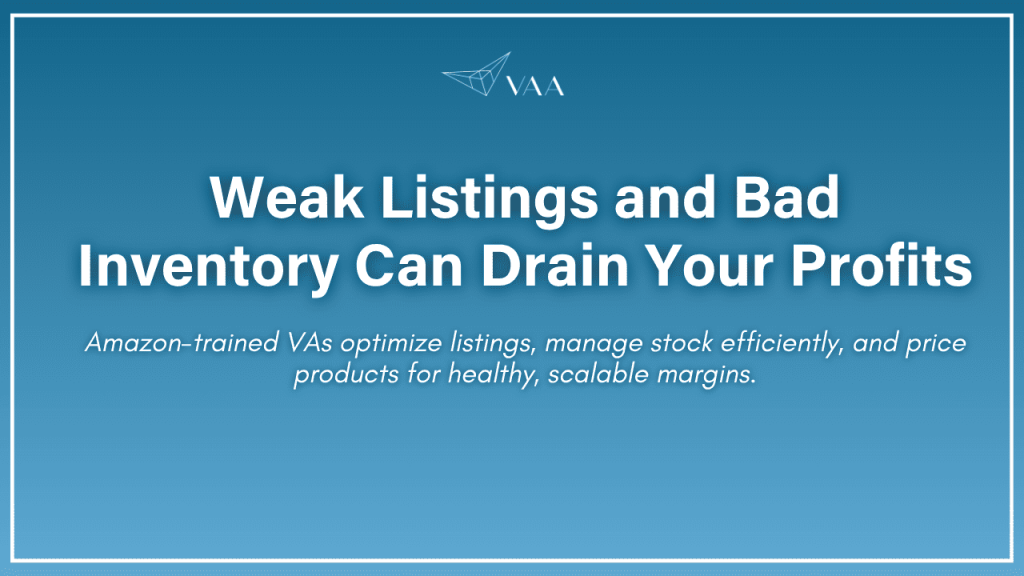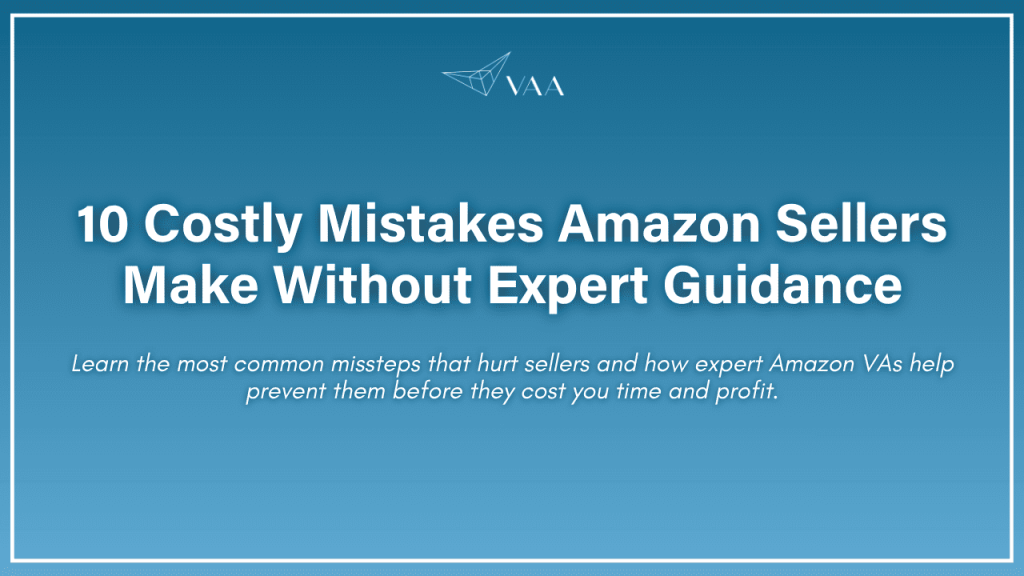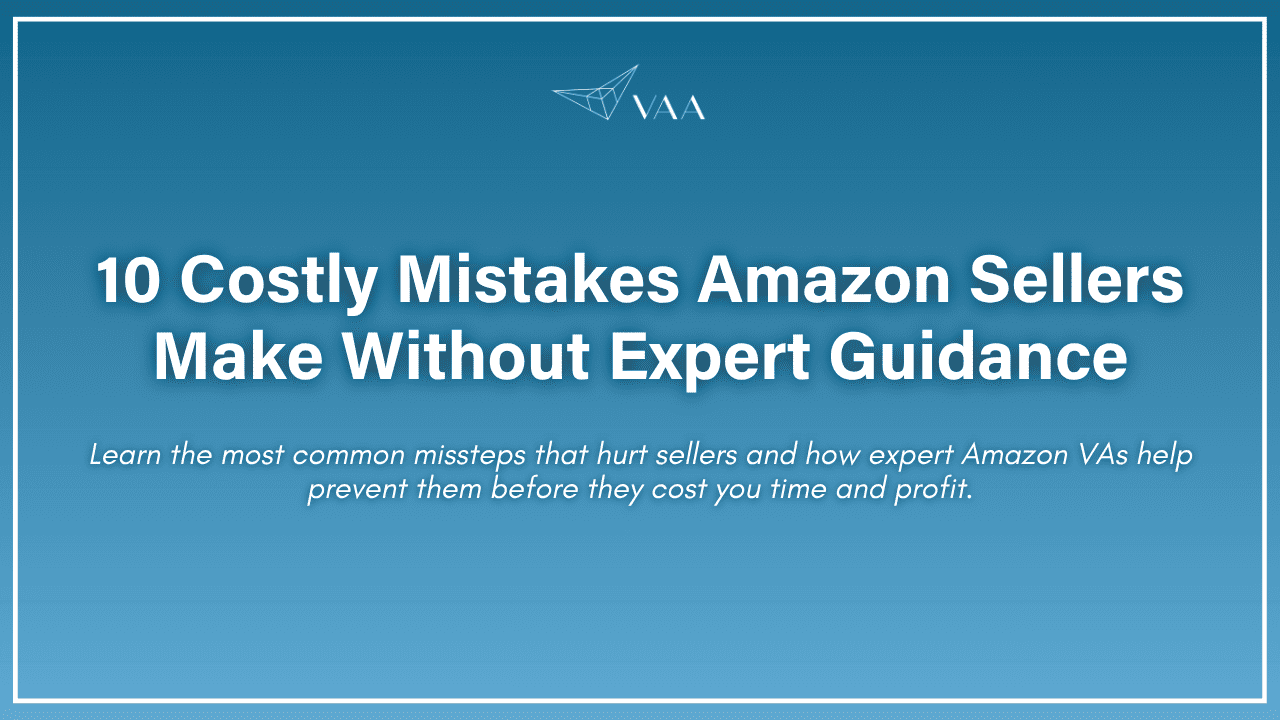Selling on Amazon offers immense opportunities, but it also comes with a steep learning curve. Many new Amazon sellers dive in enthusiastically, only to stumble over avoidable errors. Without an
Amazon expert to guide them, novice sellers often learn hard lessons that cost time, money, and momentum. In this blog, we’ll explore ten costly mistakes Amazon sellers commonly make without expert guidance—and how you can avoid them.
1. Jumping in Without Proper Market Research
One of the biggest pitfalls is rushing into an Amazon venture without thorough market and product research. New sellers may pick products based on personal hunches or follow questionable online “gurus,” instead of analyzing actual demand and competition.For instance, a seller might decide to sell yoga mats because they seem popular, only to realize later that the category is oversaturated and dominated by big brands with hundreds of reviews. Without hard data on customer demand, sales velocity, and keyword competition, sellers may enter a market that offers little chance of long-term success.An Amazon expert would stress validating demand, competition, and profitability
before investing in a product, helping sellers avoid entering losing battles. Tools like Helium 10 or Jungle Scout allow experts to uncover search volume, keyword opportunities, and sales trends, enabling data-driven decisions. The right research can prevent thousands of dollars in lost capital and set the stage for a sustainable business .

2. Choosing the Wrong Product or Niche
Product selection can make or break your Amazon business. Without guidance, many sellers choose products that seem appealing but carry hidden challenges. Take, for example, someone who decides to sell ceramic dinnerware sets without considering their weight and fragility. The shipping costs and breakage rates quickly erode profits, and negative reviews from broken deliveries can further hurt rankings.Additionally, many new sellers are unaware of seasonal demand cycles or regulatory restrictions, such as those on health supplements or children’s toys. An experienced Amazon expert will help evaluate potential products by analyzing sales trends, seasonal behavior, FBA compatibility, and category-specific risks. By taking these elements into account, sellers can choose a niche that supports long-term success rather than short-lived opportunity.
3. Ignoring Amazon’s Rules and Policies
In the rush to start selling, some overlook Amazon’s stringent rules. This mistake can be catastrophic: violating Amazon’s Terms of Service, such as manipulating reviews or selling restricted items, can lead to sudden account suspensions. Imagine a seller sourcing knockoff headphones and unknowingly infringing on a brand's trademark. Without understanding Amazon’s intellectual property rules, they could lose their entire business overnight.Amazon takes policy violations seriously, even if they result from ignorance. Sellers must stay up to date with Amazon’s evolving rules on product listings, communication with buyers, and inventory management. An Amazon expert can help interpret policies, set up compliant processes, and monitor for potential risks, ensuring sellers operate within Amazon’s guidelines. This proactive approach minimizes the risk of suspension and helps protect hard-earned seller reputations.
4. Poor Product Listing Quality
A common mistake is underestimating the importance of a high-quality product listing. Without expert guidance, sellers might throw together a listing with a vague title, sparse description, and unprofessional images. Consider a seller listing a stainless steel water bottle using only a generic product photo and no lifestyle images. Shoppers are unlikely to trust or engage with such a listing.Product listings act as your digital storefront. High-performing listings are optimized for both conversion and search visibility. An Amazon expert helps craft compelling titles with targeted keywords, bullet points that highlight unique benefits, and rich product descriptions that speak to customer pain points. Moreover, investing in professional imagery, lifestyle photos, and even video demonstrations can significantly improve your click-through and conversion rates. Listings are your sales pitch, but make sure they do the product justice.

5. Overlooking Amazon SEO and Keywords
Even with a great product and listing, customers need to be able to
find your product. Without knowing Amazon’s algorithms, many sellers fail to use relevant keywords or rely only on basic terms. For example, a seller offering a natural baby lotion might use just "baby lotion" instead of also targeting long-tail keywords like "organic newborn skin moisturizer." This drastically limits visibility.Amazon’s A9 search engine prioritizes listings that align with buyer search behavior. Keyword optimization is essential for appearing in both organic results and sponsored placements. An Amazon expert uses keyword research tools to identify top-ranking and relevant terms, incorporating them naturally across the title, bullets, backend search terms, and description. By doing so, sellers gain exposure to a wider audience and increase the likelihood of being discovered by high-intent shoppers.
6. Ineffective Inventory Management
Inventory management is a balancing act that inexperienced sellers often get wrong. Running out of stock can halt your sales momentum and hurt your listing’s ranking, while overstocking leads to high storage fees. Suppose a seller underestimates Q4 demand for their holiday-themed decor and runs out in early December. Not only do they miss the peak selling window, but they also risk losing rank to competitors.Efficient inventory planning involves tracking sales velocity, lead times, and seasonal trends. An Amazon expert uses inventory forecasting tools to calculate optimal reorder points and avoid expensive mistakes like long-term storage fees or stockouts. Smart inventory management helps sellers stay agile and customer-ready, especially during high-demand periods.
7. Miscalculating Costs and Pricing
Many Amazon sellers are surprised at how quickly expenses add up. Without an expert’s oversight, it’s easy to set a price that doesn’t cover all your costs. A seller might price a product at $19.99, thinking they’ll make $8 profit per unit, only to realize later that Amazon fees, shipping, and PPC spend leave them with only $1.50. In some cases, they may even be losing money.Break-even analysis and profit margin calculations are critical for sustainable pricing. An Amazon expert takes into account FBA fees, referral fees, manufacturing costs, shipping, taxes, returns, and advertising costs. Using Amazon's FBA calculator and custom spreadsheets, experts ensure each product has a healthy margin. Without this level of financial oversight, sellers may unintentionally sell at a loss for months.
8. Neglecting Marketing and Advertising (Amazon PPC)
"If I list it, they will come" is a costly assumption. Many new sellers shy away from Amazon PPC to save money, but end up with zero visibility. Consider a seller launching a pet grooming glove in a competitive category. Without ads, their product stays buried on page 10. With expert-led PPC, they can bid on niche keywords like "gentle deshedding glove for cats" to reach targeted buyers.Amazon advertising is both an art and a science. Experts continuously monitor campaign performance, adjust bids, refine targeting, and test ad creatives to maximize ROI. Sellers who skip advertising or manage it poorly often find themselves invisible in a competitive marketplace. Partnering with an Amazon expert ensures your ad spend is strategic and scalable, fueling your sales growth without blowing your budget.

9. Neglecting Customer Service and Reviews
Customer feedback is the lifeblood of long-term success on Amazon. Yet, many sellers fail to prioritize service and review strategies. Suppose a buyer receives a damaged item and leaves a 1-star review due to the lack of seller response. That one negative review could significantly lower conversion rates.Excellent customer service leads to better reviews, improved ratings, and higher Buy Box visibility. An Amazon expert or trained VA can manage timely responses to buyer messages, resolve complaints, and create follow-up email sequences within Amazon’s policies to encourage feedback. Establishing a customer-centric culture can turn unhappy buyers into loyal customers and generate social proof that drives new sales.
10. Not Seeking Expert Help
Amazon is a complex ecosystem, and trying to master every aspect solo is a recipe for burnout. Yet many entrepreneurs avoid seeking help. A seller might spend weeks figuring out how to upload A+ Content, while a trained Amazon expert could do it in an afternoon.Tasks like keyword research, customer service, PPC management, and listing optimization all require specific skill sets. Trying to do them all without guidance not only wastes time but also risks costly mistakes. Sellers who partner with trained virtual assistants, like those from VAA Philippines, often accelerate growth by delegating tasks and avoiding beginner errors. Getting the right help frees up time to focus on strategy and scaling your business.
Avoiding Costly Mistakes With VAA Philippines
Launching and growing an Amazon business is challenging, but you don’t have to go it alone. Each of the mistakes above is avoidable with the right knowledge and preparation. By learning from common pitfalls and, even better, tapping into the guidance of experienced professionals, you can sidestep the setbacks that stall other sellers.
VAA Philippines offers highly trained Amazon experts who understand the ins and outs of the platform. Whether it’s listing optimization, customer service, or PPC management, their team can support you in building a resilient, profitable Amazon business. With the right guidance, you can make informed decisions and focus on scaling instead of scrambling.



